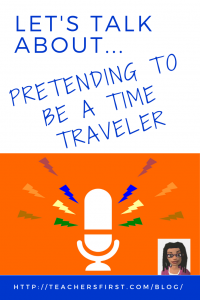 I’m thinking back to my Teach Like a Pirate post. There are so many fun “holidays” that you could use for your hook. For example, Saturday is “pretend to be a time traveler” day. This day could be the anchor for a very cool humanities project.
I’m thinking back to my Teach Like a Pirate post. There are so many fun “holidays” that you could use for your hook. For example, Saturday is “pretend to be a time traveler” day. This day could be the anchor for a very cool humanities project.
Arrange students in small groups to form their own production company for a movie based on time travel. Ask them to create a story based on a character from the time period they are studying in history arriving in the current day via time travel. As part of the project, they could create promotional materials for the marketing department to use when advertising the movie. To help students understand the expectations, you could share materials from Find Me in Paris along with a rubric for the various parts of the project.
You could ask the students to create a number of items including:
- A storyboard: Even if you don’t require students to write out the entire movie script, they will need to create a plot to work from. Use ReadWriteThink’s Story Map (reviewed here) or Plot Diagram to help students organize the events in their story.
- A video trailer: Every movie needs a trailer video. Have students use Adobe Spark Video (reviewed here) or Animoto (reviewed here) to create a video summary of their story. You can “punch up” this activity by narrating the video using a student-created MP3 for the soundtrack. Recording the file is easy with Online Voice Recorder (reviewed here)
- A movie poster: Share this sample from Find me in Paris before introducing students to BigHugeLabs’ Movie Poster Maker (reviewed here). Be sure to create an educator’s account first to make assignment submission easier.
- A Facebook page: Since fans love to see the thoughts of their favorite characters, a Fakebook (reviewed here) page would be a great addition to this project. Students would need to think critically about how their historical character might think and speak. Other social Media templates are available here.
After they are done creating, students can share their work with each other in a number of ways to get feedback. Using Twiducate (reviewed here) students can post to a class social sharing space. Padlet (reviewed here) is also a great way to facilitate student sharing and feedback. If your school uses a learning management system such as Edmodo (reviewed here) students can certainly share their work in that environment as well.
Helping students understand copyright, creative commons and attribution is very important. This project would be the perfect place to include a few Digital Citizenship mini-lessons. Be sure to check out our list of free image resources to help you plan the mini-lessons.
What fun holiday would you use to inspire a lesson?

